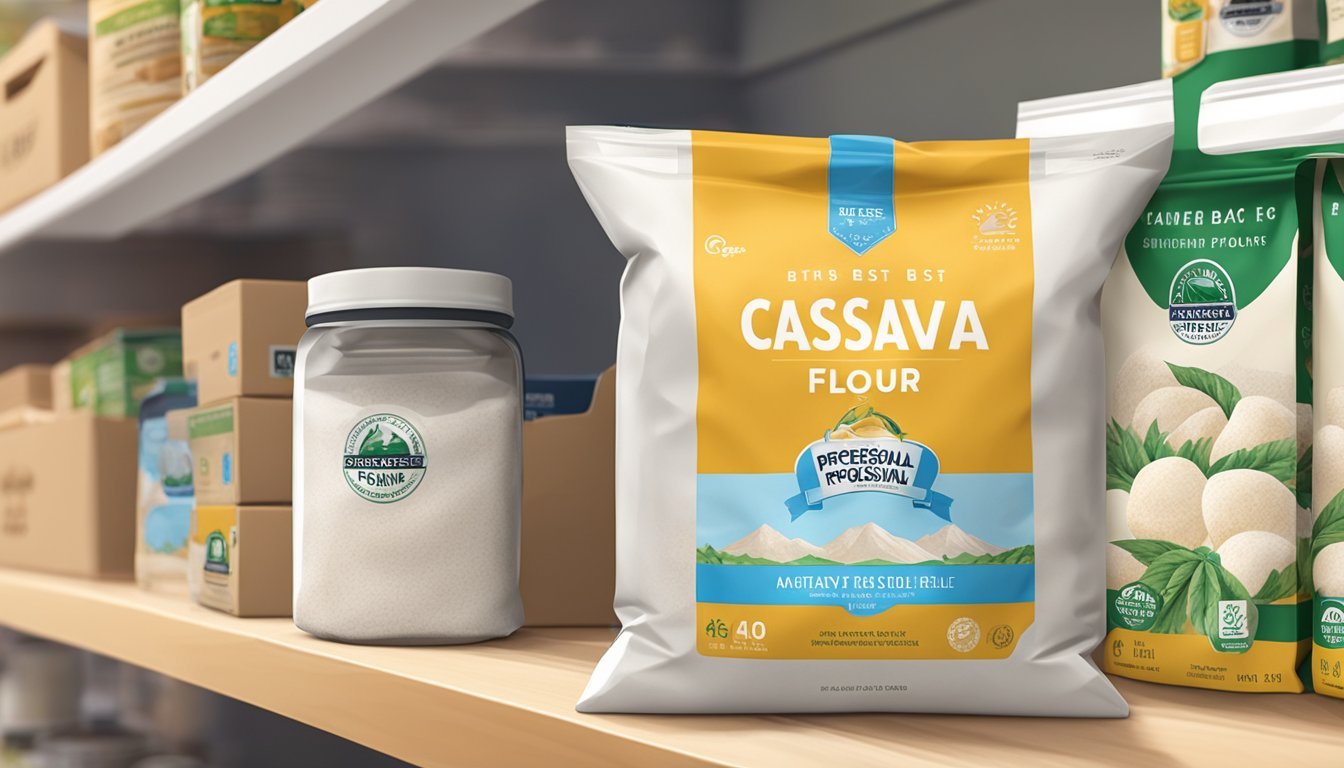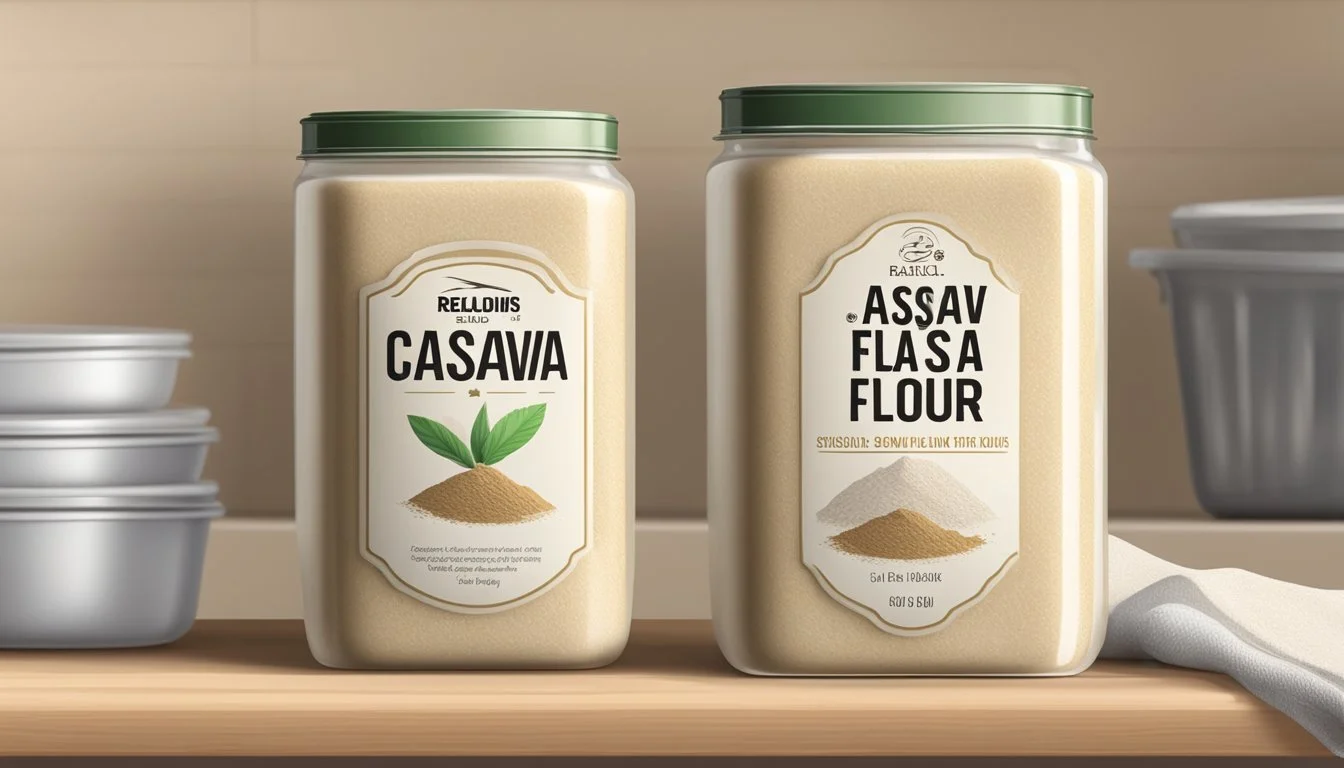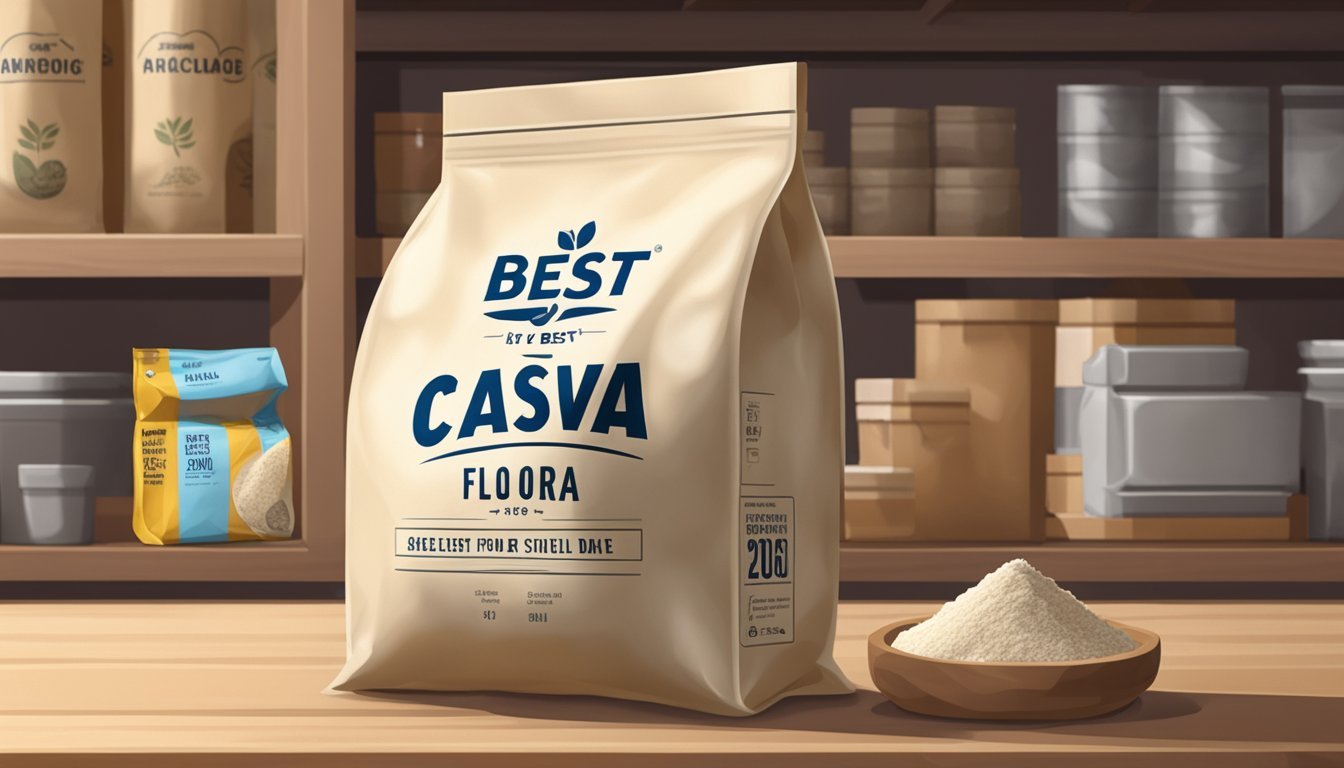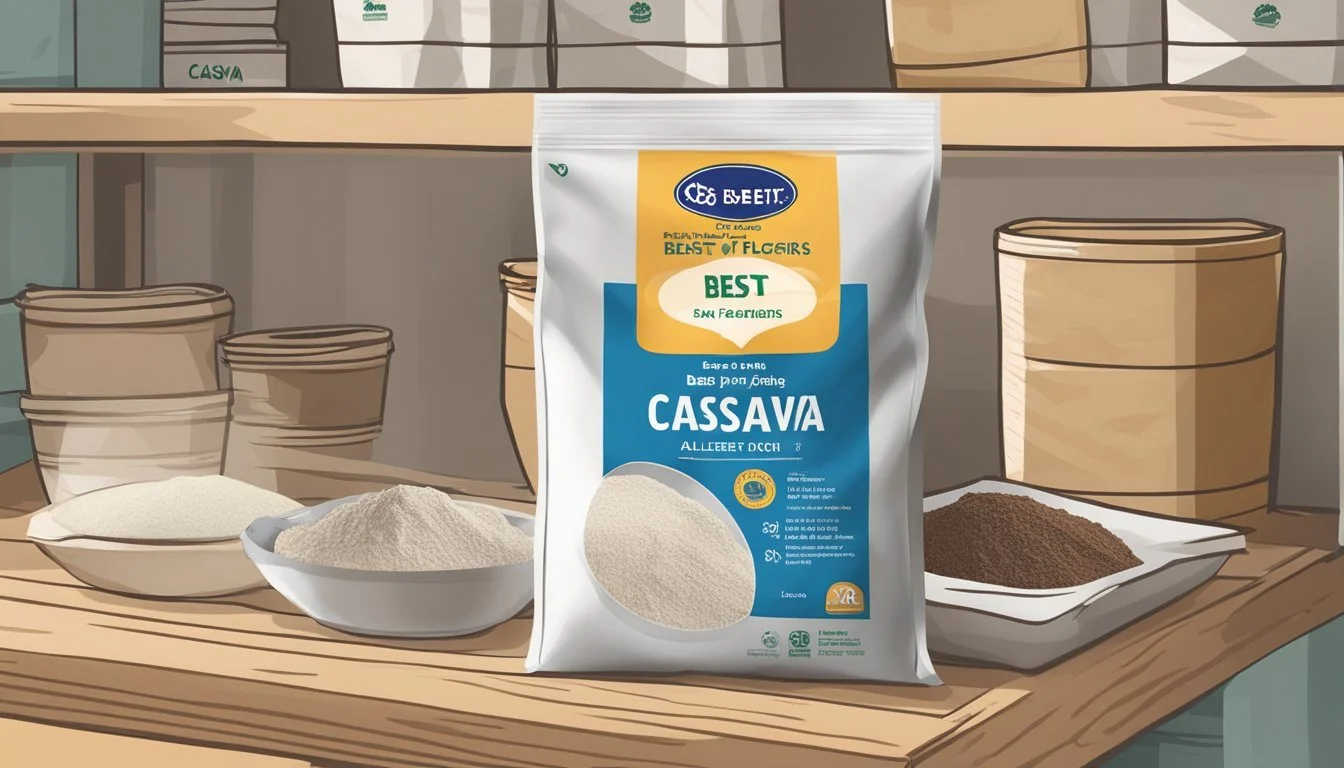How Long Does Cassava Flour Last?
Shelf Life and Storage Tips
Cassava flour is a gluten-free alternative to traditional wheat flour, derived from the root vegetable cassava. It is becoming increasingly popular for its versatility and health benefits. As a gluten-free option, it is particularly useful for those with celiac disease or gluten intolerance, as well as for those seeking to vary their dietary sources of flour. The flour offers a neutral taste and a texture suitable for many baking recipes, making it an excellent option for bread, pasta, and other baked goods.
Considering its rising popularity, the longevity and proper storage of cassava flour are essential to maintain its quality. When stored correctly in a cool, dry place, cassava flour can last up to two years unopened. However, once the package is opened, its shelf life decreases and it is advisable to use it within a year to ensure its optimal taste and texture. To extend its lifespan, storing the flour in an airtight container can guard against moisture and other contaminants.
Moreover, the placement of the flour within the household can affect its shelf life. It should be kept distanced from strong odors, like those from spices or onions, which could be absorbed by the flour and alter its flavor. For those who do not use cassava flour frequently, freezing it in an airtight container or freezer bag, with the date labeled, can be an effective way to retain its freshness for an extended period.
Understanding Cassava Flour
Cassava flour is derived from the root of the cassava plant and is known for its role as a gluten-free, grain-free alternative to traditional wheat flours.
Composition and Nutritional Profile
Cassava, also known as yuca or manioc, is a starchy root vegetable native to South America. Cassava flour is made by peeling, drying, and grinding the root. It's rich in carbohydrates, providing a high energy source, yet it's also considered to have a lower glycemic index compared to other flours.
Nutritionally, cassava flour offers various benefits:
Carbohydrates: It's predominantly composed of carbohydrates, which makes it an efficient source of energy.
Fiber: Contains a considerable amount of dietary fiber, promoting digestive health.
Resistant Starch: The resistant starch in cassava flour can aid in blood sugar management and support gut health.
Vitamins and Minerals: It has a modest vitamin C content and provides minerals such as iron.
Cassava Flour vs Other Flours
Cassava flour is unique in that it is gluten-free, grain-free, nut-free, and paleo-friendly, making it a suitable substitute for people with varying dietary restrictions.
Comparatively:
Wheat Flour: Cassava is a viable alternative for those avoiding gluten as it's naturally gluten-free, unlike wheat flour.
Coconut Flour: Unlike the more absorbent coconut flour, cassava flour has a similar weight and texture to all-purpose flour, which requires less adjustment in recipes.
Tapioca Flour: Although both come from the cassava root, tapioca flour is a starch extracted from cassava, while cassava flour is the whole root ground up, giving it a different nutritional profile and baking properties.
Gluten-Free Flours: Cassava flour's similarity to the consistency and binding qualities of regular flour sets it apart from many other gluten-free flours that often require a blend to replicate the texture of wheat flour.
Cassava flour is considered a paleo flour due to its unprocessed nature and absence of grains, making it suitable for paleo diets. It has gained popularity for its versatility and ease of use in gluten-free and grain-free recipes.
Shelf Life Determinants
The shelf life of cassava flour, as with many flour types, pivots on specific storage conditions and its exposure to elements that accelerate spoilage. Understanding these determinants is critical in maintaining both its quality and freshness.
Factors Affecting Freshness
Several key elements directly influence the longevity of cassava flour. Maintaining the quality and freshness primarily revolves around the following:
Storage Environment: Cassava flour should be kept in a cool, dry place, away from direct sunlight as these variables can degrade the quality.
Temperature and Moisture: Exposure to high temperature or excessive moisture accelerates spoilage.
Container: Storing in an airtight container can significantly extend the shelf life by minimizing contact with air and humidity.
Visual and Olfactory Indicators
The appearance, color, and smell of cassava flour are reliable indicators of its condition:
Appearance: The flour should be fine and powdery; any change such as lumps or the presence of mold suggest spoilage.
Color: A consistent off-white hue is normal; discoloration could signal deterioration.
Smell/Odor: Fresh cassava flour has a neutral, earthy aroma. An off or rancid odor indicates that the flour is no longer suitable for consumption.
Storing Cassava Flour
Proper storage of cassava flour can significantly extend its shelf life, keeping it fresh for baking and culinary needs. Moisture and pests are the primary adversaries, so preventing their intrusion is crucial.
Ideal Storage Conditions
Cassava flour thrives in conditions that are cool and dry. Elevated moisture levels can degrade the flour's quality and shorten its shelf life. Ideally, individuals should store cassava flour at room temperature within a pantry or cabinet that maintains consistent conditions free from humidity and temperature fluctuations.
Storage Tips and Techniques
Airtight Containers: Sealing cassava flour in an airtight container protects against moisture and pests. Containers made from materials like glass or food-grade plastic are suitable.
Freezing: For long-term storage, cassava flour can be placed in the freezer. Prior to freezing, it's advisable to package the flour in a sealable bag or container to prevent condensation, which could introduce moisture when thawing.
Refrigeration: Although not always necessary, refrigerating cassava flour can extend its shelf life beyond the pantry duration, especially in warmer climates.
Glass Jars: Using glass jars with tight-fitting lids can not only offer a seal against pests and moisture but also allows for easy visual inspection of the flour.
By adhering to these storage guidelines, they can maintain the quality of cassava flour and enjoy its benefits for an extended period.
Using Cassava Flour
Cassava flour is a versatile ingredient that can be used in various recipes, offering a gluten-free alternative to traditional wheat flours. Its unique flavor and properties make it suitable for a range of baked goods and culinary applications.
In the Kitchen
Cassava flour is known for its earthy and subtly nutty flavor, making it an excellent choice for recipes that can accommodate these taste notes. Bakers often use it in gluten-free baking for products such as bread, pasta, and flatbreads. Due to its properties, cassava flour can be used to create a texture similar to that of wheat flour in baked goods, which is particularly useful for those who have gluten sensitivities.
Substitutes: While it can replace wheat flour, it is not a one-to-one substitute. Proportions may need adjustment.
Uses: Besides baking, it can be a thickener for sauces and soups, adding fiber without altering the flavor significantly.
Recipes: Detailed recipes might include specific uses like tortillas, waffles, or chocolate chip cookies.
Cassava flour's suitability for an oven's varying temperatures underscores its adaptability in cooking and baking.
Handling and Preparation
Cassava flour requires certain conditions for optimal handling and preparation. To maintain its freshness and texture, it must be stored properly—drying and grinding processes play a significant role in the final product's quality.
Storage: Keep it in an airtight container to protect it from moisture and air.
Preparation: When ready to use, cassava flour should be sifted to prevent clumping.
While freezing is not generally recommended, if necessary, ensure the flour is well-sealed and protected from freezer burn. Techniques vary for different recipes, so those preparing cassava flour for baking bread may need to mix it with other flours or use different oven temperatures to achieve the ideal texture and rise.
Health and Dietary Considerations
When considering cassava flour in the context of health and dietary needs, it is important to assess its compatibility with specific diets and its potential health impacts. This gluten-free, grain-free flour offers an alternative for various dietary restrictions while also having unique nutritional properties.
Benefits for Specific Diets
Gluten-Free: Cassava flour is naturally gluten-free, making it suitable for individuals with celiac disease or gluten intolerance.
Grain-Free and Paleo-Friendly: As it is not derived from grains, cassava flour is a viable option for paleo and grain-free diets.
Whole30 Compliant: Cassava flour can be used during a Whole30 program as it does not contain sugar or artificial ingredients.
Vegan Diets: It is appropriate for vegans, offering a plant-based substitute for recipes requiring flour.
Low-Glycemic Index: Suitable for diabetic individuals due to its lower glycemic index compared to traditional wheat flour.
Potential Health Impacts
Caloric Content: Cassava flour is calorie-dense, so portion control is advised, especially for those monitoring calorie intake.
Fiber Provision: It provides fiber, which can support gut health and potentially alleviate digestive issues.
Digestive Health: As a resistant starch, cassava flour may improve digestive health, but excessive consumption could lead to digestive discomfort.
Blood Sugar Management: The fiber in cassava flour can help manage blood sugar
Safety and Risk Factors
When considering the longevity and safety of cassava flour, it's crucial to understand its potential toxicity and how it deals with spoilage. Proper handling and storage play pivotal roles in mitigating these risks.
Toxicity and Allergies
Cassava flour originates from the cassava root, which contains cyanide compounds. These compounds are reduced to safe levels during the flour processing stage, particularly when the root is peeled, as the majority of these compounds are found in the peel. Still, one should be aware that improperly processed cassava flour could pose a health risk if it contains residual cyanide. Additionally, while cassava flour is generally allergen-friendly, as it is gluten, grain, and nut-free, individuals should verify its compatibility with any specific food allergies they may have.
Dealing with Spoilage
Cassava flour's susceptibility to spoiling is similar to other dry goods – it can become rancid, develop mold, or lose its quality past its expiration date. Users should perform a sensory check for signs of spoilage such as an off smell, a change in color, or the presence of mold. If any of these signs are evident, the flour should not be used. While cassava flour may remain safe post-expiration under ideal storage conditions, its quality may diminish; thus, one should be vigilant about storage practices to extend its shelf life and maintain safety.
Storage conditions to prevent rancidity and spoilage:
Keep in a cool, dry place.
Seal tightly in a container after opening.
Avoid exposure to direct sunlight and humidity.
The above guidelines help maintain the integrity of the flour and reduce the risk of consuming spoiled cassava flour.
Frequently Asked Questions
How long does unopened cassava flour last?
Unopened cassava flour generally has a shelf life of up to 2 years when stored in a cool, dry place. If kept in an airtight container, its freshness can be extended.
Can I store cassava flour in the refrigerator or freezer?
Yes. In the refrigerator, cassava flour can last 1 to 2 years; in the freezer, it's good for up to 2 years. An airtight container or freezer bag is recommended for storage.
What are the signs that cassava flour has gone bad?
Cassava flour that has a strange smell, visible mold, or an off taste should be discarded. Additionally, if it has been exposed to moisture or pests, it is no longer good for use.
How should cassava flour be stored once opened?
Once opened, cassava flour should be transferred to an airtight container to keep it fresh for around a year at room temperature. Keeping it away from strong odors is crucial since they can be absorbed by the flour.
Is cassava flour suitable for baking?
Cassava flour is excellent for baking and can often replace wheat flour in recipes. It has a powdery texture that makes it conducive for a wide range of baked goods.
Cassava Flour in Different Cultures
Cassava flour, derived from the tuberous root vegetable known as yuca or manioc, plays a crucial role in the cuisines of South America, Africa, and Asia due to its versatility in recipes ranging from daily staples to snacking and its suitability for paleo-friendly diets.
Cassava's Role in World Cuisines
South America: The birthplace of cassava, South American cuisines, use this staple not only for traditional dishes such as arepas but also for thickeners and gluten-free alternatives. In Brazil, cassava flour is a key ingredient in farofa, a toasted flour mixture served alongside various meals.
Africa: A primary source of carbohydrates, cassava flour in Africa is essential for producing fufu—a dough-like and staple food. Moreover, it is used in attiéké, a side dish similar to couscous, which showcases the ingredient’s adaptability.
Asia: This region incorporates cassava flour into numerous products, including noodles and a variety of flatbreads. It is also used as a thickener for desserts and sauces in Asian cuisines.
Traditional Dishes and Innovations
Traditional Dishes:
South America: Pão de queijo (Brazilian cheese bread), an emblematic snack, uses manioc starch.
Africa: In Nigeria, cassava flour is transformed into gari, a fermented product enjoyed as a snack or side.
Asia: In the Philippines, cassava cake is a beloved delicacy made from grated manioc root and coconut milk.
Innovations:
Paleo-Friendly Options: Cassava flour's grain-free property makes it a preferred substitute in paleo recipes, resulting in creations like paleo tortillas.
Gluten-Free Recipes: Chefs around the globe are increasingly using cassava flour to craft gluten-free versions of bread, pastries, and other baked goods.
Through both traditional uses and innovative culinary practices, cassava flour remains an integral component of diverse cuisines worldwide, appreciated for its flexibility and nutritional profile.






